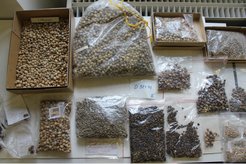PARIS (Prunus Archaeobotanical Research Investigation and Survey) Project

The Prunus species is one of the most economically important tree taxa. The fruits from these trees (apricots, peaches, plums, cherries, etc.) are cultivated worldwide and are considered fundamental ingredients for many cuisines. This culinary popularity, however, is not reflected in the scientific understanding of its origins, including its center of domestication. Genetic studies suggest that most modern Prunus taxa are first generation cousins and have been propagated through artificial cloning for centuries if not millennia. Therefore, geneticists find it difficult to unravel the domestication of Prunus fruits. This project will approach determining Prunus domestication by incorporating archaeological remains to create a temporal and geographical link to ancient Prunus cultivation.
We seek to create a complementary approach to traditional microscopic fruit stone identification methods by using morphometric measurements to differentiate between Prunus taxa. This approach relies on compiling and mapping historical and archaeobotanical data on Prunus species dispersal, creating a model of modern Prunus measurements that are differentiated using linear discriminant analysis, and using the model to differentiate unknown archaeological and historical Prunus stones. This archaeobotanical approach is designed to complement concurrent genetic research on the Prunus genus headed by Dr. Logan Kistler at the Smithsonian Institute in Washington, DC.


